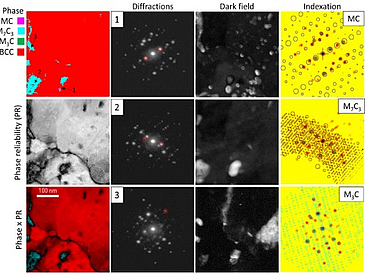Antonio Carlos de F. Silveira, Lisa T. Belkacemi, Pedro José de Castro, Marco Schowalter, Rainer Fechte-Heinen, Jérémy Epp
Acta Materialia 283 (2025): 120488
https://doi.org/10.1016/j.actamat.2024.120488
Additively manufactured components are generally heat treated to remove the undesired microstructure formed during the repeated heating-cooling cycles inherent to the process, known as intrinsic heat treatment (IHT). Recently, the IHT has been explored as a driving force for precipitation hardening in steels which can potentially shorten the manufacturing chain of AM components. However, the mechanisms behind the formation of secondary phase precipitates during the complex thermal history remains unclear. In this work, a combination of in situ high energy X-ray diffraction, atom probe tomography, scanning and transmission electron microscopy were used to reveal the precipitation sequence in an X40CrMoV5–1 tool steel during laser-directed energy deposition (L-DED). V-rich MCN and V8CN7 carbonitrides, as well as, Fe-Cr-rich M3C and M7C3 carbides were formed at different stages of the L-DED. Their evolution and resulting chemical stoichiometry was correlated to the exact phase transformation occurring in the microstructure during the IHT over different regions along the built direction. Finally, the combined results from the in situ and ex situ experiments enabled us to retrace the history of the full microstructure during the L-DED process. The findings lead to the conclusion that secondary hardening effect in tool steel is, as expected, sensitive to the severity of the IHT, and if limited, can result in a tempered microstructure comparable to the ones conventionally obtained after tempering heat treatments.


